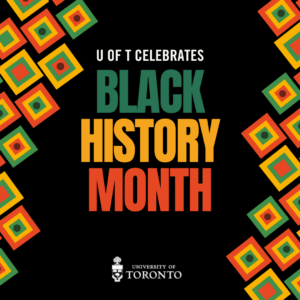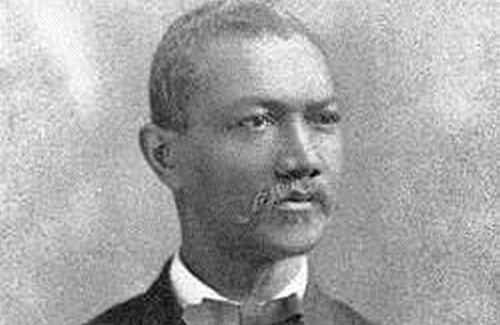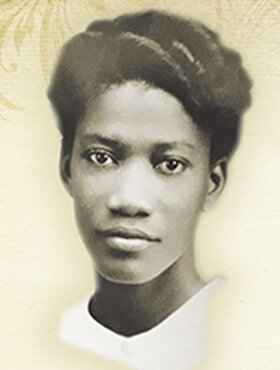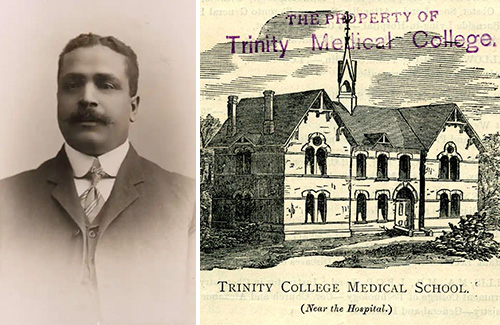Black History Month 2024
In 1995, Black History Month was recognized officially in Canada to honour the legacy of Black people in Canada and their communities. This page celebrates Black members of the Trinity community – from the College’s early days to present. The College encourages everyone to educate themselves around Black History Month not only in February but throughout the year.
 John W. Graham Library’s Circulation Display: Black History Month: February is Black History Month in Canada and 2024 is also the 10th year of the International Decade for People of African Descent. This month, the Graham Library’s Circulation Display highlights history and international relations titles with a spotlight on Africa. Learn about African history and politics with titles such as African political thought: an intellectual history of the quest for freedom, and Beyond history: African agency in development, diplomacy and conflict resolution. Drop by the library to view the Graham Library display; borrow any of the books by asking a staff member at the Circulation Desk for assistance.
John W. Graham Library’s Circulation Display: Black History Month: February is Black History Month in Canada and 2024 is also the 10th year of the International Decade for People of African Descent. This month, the Graham Library’s Circulation Display highlights history and international relations titles with a spotlight on Africa. Learn about African history and politics with titles such as African political thought: an intellectual history of the quest for freedom, and Beyond history: African agency in development, diplomacy and conflict resolution. Drop by the library to view the Graham Library display; borrow any of the books by asking a staff member at the Circulation Desk for assistance.

Celebrating Black History Month at U of T: The University of Toronto’s Anti-Racism and Cultural Diversity Office celebrates Black History Month with events and programming for the community. View more events on the February 2024 calendar. To learn more about this month, find inclusive guides and related resources, please visit the Dates of Recognition, Observance & Celebration webpage on the Division of People Strategy, Equity & Culture’s website.
CELEBRATING MEMBERS OF THE TRINITY COMMUNITY
For Black History Month, Trinity College recognizes and celebrates members of the community who have made a difference.
Read the stories of our Trinity College alumni – trailblazers, change makers and community leaders who fought against racism, barriers and challenges of their times. As the College continues our collective work to make the community a more welcoming, inclusive and positive place, it’s important to reflect on our history and remember those who made a mark at the College and the world.
To celebrate diversity and inclusion, over the last couple of years, we have been profiling members of the Trinity community to get to know one another better. Below, we have included some of our Black-identifying Trinity students and staff. Read the Q&As and learn more about their daily lives and what is most important to them.
Click on the names to learn more about these outstanding members of the Trinity community.
- Alum: Alexander Augusta
- Alum: Myrtle Burgess
- Alum: Gloria Carpenter
- Alum: George Carter
- Alum: Austin Clarke
- Alum: Ivan McFarlane
- Alum: Ava Rich
- Alum: Alfred Schmitz Shadd and Arthur J. Thomas
- Student: Denise Byard (Feb. 2022)
- Student: Craig Lemming (Feb. 2022)
- Staff: Ramata Tarawally (Feb. 2022)
- Staff: Dadir Yusuf (Feb. 2022)
TRINITY COLLEGE ALUMNI
Alexander Augusta (1825-1890)

Dr. Alexander Augusta used his skills to fight for civil rights
Doctor of Courage and Civil Right’s Hero: Rejected by American universities, Alexander Augusta completed his medical degree at Trinity Medical College then used his skills to fight for civil rights in his homeland.
Alexander Augusta was the first black medical student in Canada West – and Trinity’s first Black student – and would later go on to teach anatomy for almost a decade at Howard University in Washington, as the first black professor of medicine in the United States. Alexander Augusta graduated from Trinity’s medical faculty in 1860 with a Bachelor of Medicine degree. He then worked for several years as a physician in Toronto and became a leader in the Black community. He offered medical care to the poor, founded a literacy society that donated books and school supplies to black children and was active in antislavery circles on both sides of the border.
Honouring Dr. Alexander Augusta: On February 9, 2023, new Heritage Toronto plaques were unveiled to honour Canada’s first Black doctors – Dr. Alexander Augusta and Dr. Anderson Abbott – in Seeley Hall (see images below). Dr. Nav Persaud, a staff physician at St. Michael’s Hospital and former Academic Don at Trinity, was part of the team that brought Dr. Augusta’s story forward to Heritage Toronto. At the event, organizers and speakers shared inspiring stories of the trailblazing and courageous doctors. The commemorative plaques were installed near the U of T campus (northwest corner of College Street and University Avenue, near Queen’s Park) in May 2023.

Unveiling of Heritage Toronto plaques to honour Dr. Alexander Augusta and Dr. Anderson Abbott.
Dr. Nav Persaud, a staff physician at St. Michael’s Hospital and former Academic Don at Trinity College, was part of the team that brought Augusta’s story forward to Heritage Toronto. Dr. Persaud is the lead author of this paper in the Canadian Medical Education Journal: Dr Alexander Augusta sought medical education in Canada but became a medical educator in America after the Civil War“. The life of Dr. Augusta also demonstrates the importance of teaching trainees about the effects of racism within Canadian medical education.
>> Toronto Star: He never learned about Canada’s first Black doctors in medical school. He wants all students to know their names
Trinity College: The Dr. Alexander Thomas Augusta Award: In 2023, Trinity College renamed the Black, Indigenous or a Person of Colour (BIPOC) Student Award to the The Dr. Alexander Thomas Augusta Award in recognition of Dr. Augusta who attended Trinity’s medical school. The Dr. Alexander Thomas Augusta Award (one or more awards, each valued at up to $5,000) is awarded to a Trinity student identifying as Black, Indigenous or a Person of Colour on the basis of financial need and demonstrated or planned community contributions on or off campus. The BIPOC Award was created in 2020 as a way to increase in financial aid available to BIPOC students. The award was in response to one of the recommendations of the Trinity College Task Force on Anti-Black Racism and Inclusion, which called for an increase in financial aid available to BIPOC students with a particular focus on bursaries and needs-based awards. In addition, through the generosity of the College’s donors, the Trinity College BIPOC Bursary Fund was also created to support students solely based on financial need.
Myrtle Burgess (1888-1973)
The Story of the Burgess Family and Myrtle Burgess
This story offers an important glimpse into the discrimination people of colour faced in the early 20th century. In the early 1900s, Provost Thomas Macklem admitted three students to Trinity College and St. Hilda’s College, siblings from St. Louis, Missouri – Wilmot, Myrtle and Elmer Burgess. However, unbeknownst to Provost Macklem when he made the offer of acceptance to the older two siblings, the students were Black. Read about the Burgess family and Myrtle Burgess, the College’s first female Black student. It is a credit to Myrtle’s intelligence, drive and tenacity that even in the face of injustice, she continued her studies at Trinity College. Myrtle Burgess (Photo: back row, second from left) attended Trinity from 1905 to 1909.
Gloria Carpenter (1922-1995)

Gloria Carpenter was a pioneer who helped bring legal change to the Caribbean
Patricia Cumper, Gloria Carpenter’s daughter, retells her family’s story (University of Cambridge: Facebook).
George Carter (1921-2018)

The Hon. Justice George Carter: 1st Canadian-born black judge
The Making of a Judge: George Carter, the first Canadian-born black judge in the country (in 1980). George Carter graduated from Trinity in 1945, and he worked as a train porter to pay his tuition while a law student at York University (one of the only jobs available to Black men at that time). After graduating from law school in 1948, he practised real estate, criminal and family law for three decades.
The Making of a Judge is the story of The Honourable Justice George E. Carter, told by his daughter Linda V. Carter.
Global News sits down with Judge George Carter’s family for: Black History Month profile: Toronto’s George Carter, the first Black judge born in Canada (Feb. 15, 2022)
Ava Rich (1928-2022)

Ava Coley Rich was one of the first Black students from the Caribbean islands to enter Trinity in the post-colonial, post-World War II period
Ava Rich entered Trinity College in 1953, one of the first of the post-colonial, post World War II wave of Black students who were turned away from Britain and the United States by restrictive immigration policies. Her daughter said: “Trinity and St Hilda’s (she was in residence) provided a great space for her to grow.”
Austin Clarke (1934-2016)
Novelist Austin Clarke: advocate for Black rights and champion for social justice
Austin Clarke: U of T alum was among the first writers in Canada to pay attention to everyday life in Toronto. He was also a champion of social justice. Austin Clarke passed away on June 26, 2016. He attended Trinity for a short period in the mid-1950s and received an honorary degree from the College in 2000.
Ivan McFarlane (1936-2020)

Remembering Ivan McFarlane: Ivan was a great friend to Trinity College, a frequent presence who contributed both to the serious business of governance, and the business of enjoying fellowship and fun.
During Black History Month 2020, Trinity alumnus Ivan Owen McFarlane (Class of 1964) passed away. The anniversary of his death presents an opportunity to reflect on the circumstances that brought Ivan to us from his home in Jamaica, circumstances that brought a number of other young men and women from the West Indies in the 1950s and 1960s to the College.
Alfred Schmitz Shadd (1870-1915) and Arthur J. Thomas (c.1870-1934)

Proponents of the rights of Black people.
In honour of Black History Month 2024, the Trinity College Archives focuses on two Canadian-born 19th century graduates of the Trinity Medical College, Alfred Schmitz Shadd (1870-1915) and Arthur J. Thomas (c.1870-1934). Their trajectories led them in quite different geographical directions but in each of their communities they actively engaged as proponents of the rights of Black people. Learn more about Dr. Shadd (photo above) and Dr. Thomas here.
Trinity College admitted a Black student to its Faculty of Medicine in 1853 (Dr. Alexander Augusta) and continued to admit Black students when the Medical School (later Trinity Medical College) opened in 1871.
Categories: Alumni; College News; Discover Trinity; Faculty & Staff; Student News; Theology; University of Toronto News




